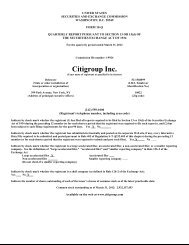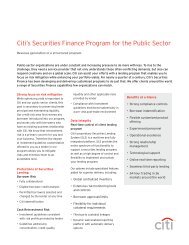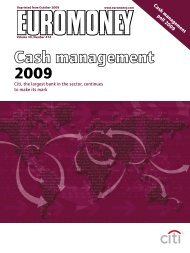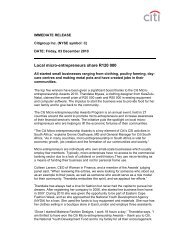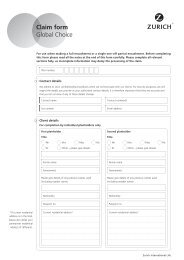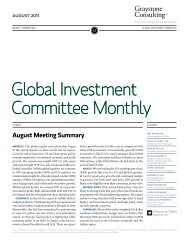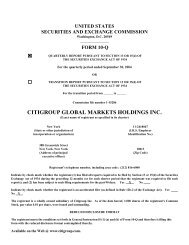BALANCE SHEET REVIEWThe following sets forth a general discussion of the changes in certain of the more significant line items of Citi’s Consolidated Balance Sheet during 2010. Foradditional information on <strong>Citigroup</strong>’s deposits, debt and secured financing (lending), see “Capital Resources and Liquidity—Funding and Liquidity” below.In billions of dollarsDecember 31,2010 2009<strong>Inc</strong>rease(decrease)%ChangeAssetsCash and deposits with banks $ 190 $ 193 $ (3) (2)%Loans, net of unearned income and allowance for loan losses 608 555 53 10Trading account assets 317 343 (26) (8)Federal funds sold and securities borrowed or purchased under agreements to resell 247 222 25 11Investments 318 306 12 4Other assets 234 238 (4) (2)Total assets $1,914 $1,857 $ 57 3%LiabilitiesDeposits $ 845 $ 836 $ 9 1%Federal funds purchased and securities loaned or sold under agreements to repurchase 190 154 36 23Short-term borrowings and long-term debt 460 433 27 6Trading account liabilities 129 138 (9) (7)Other liabilities 124 141 (17) (12)Total liabilities $1,748 $1,702 $ 46 3%Total equity $ 166 $ 155 $ 11 7%Total liabilities and equity $1,914 $1,857 $ 57 3%Cash and Deposits with BanksCash and deposits with banks are composed of Cash and due from banksand Deposits with banks. Cash and due from banks includes (i) allcurrency and coin (both foreign and local currencies) in the possession ofdomestic and overseas offices of <strong>Citigroup</strong>, and (ii) non-interest-bearingbalances due from banks, including non-interest-bearing demand depositaccounts with correspondent banks, central banks (such as the FederalReserve Bank), and other banks or depository institutions for normaloperating purposes. Deposits with banks includes interest-bearing balances,demand deposits and time deposits held in or due from banks (includingcorrespondent banks, central banks and other banks or depositoryinstitutions) maintained for, among other things, normal operating purposesand regulatory reserve requirement purposes.During 2010, cash and deposits with banks decreased $3 billion, or 2%.The decrease is composed of a $5 billion, or 3%, decrease in Deposits withbanks offset by a $3 billion, or 10%, increase in Cash and due from banks.LoansLoans include credit cards, mortgages, other real estate lending, personalloans, auto loans, student loans and corporate loans. <strong>Citigroup</strong> loans arereported in two categories—Consumer and Corporate. These categoriesare classified according to the segment and sub-segment that manage theloans. As of December 31, 2010, Consumer and Corporate loans constituted71% and 29%, respectively, of Citi’s total loans (net of unearned income andbefore the allowance for loan losses).Consumer loans (net of allowance for loan losses) increased by $27 billion,or 7%, during 2010. On January 1, 2010, approximately $120 billion ofConsumer loans (primarily credit card receivables and student loans, net of$13 billion in allowance for loan loss reserves) were consolidated as a result ofthe adoption of SFAS 166/167. The increase in credit cards and student loansas a result of the adoption of SFAS 166/167 was partially offset by paydownsover the year on credit cards and the sale of The Student Loan Corporation.Also offsetting the increase was a $27 billion, or 12%, decrease in Consumermortgage and real estate loans, driven by run-off, net credit losses and assetsales, as well as the sale of a <strong>Citigroup</strong> auto portfolio.Corporate loans (net of allowance for loan losses) increased by$26 billion, or 16%, during 2010, primarily due to the $28 billion ofCorporate loans consolidated as of January 1, 2010 as a result of theadoption of SFAS 166/167. The majority of the loans consolidated wereCiti-administered asset-backed commercial paper conduits classified as loansto financial institutions. In addition, a $2 billion, or 32%, decrease in theallowance for loan loss reserves added to the increase of Corporate loans forthe year. These increases were partially offset by the impact of a $7 billion, or21%, decrease in Corporate mortgage and real estate loans, primarily due torun-off and net credit losses.54
During 2010, average Consumer loans (net of unearned income) of$495 billion yielded an average rate of 9.4%, compared to $456 billion and7.8%, respectively, in the prior year. Average Corporate loans of $189 billionyielded an average rate of 4.5% during 2010, compared to $190 billion and6.3%, respectively, in the prior year.For further information on Citi’s loan portfolios, see generally “ManagingGlobal Risk—Credit Risk” and Notes 1 and 16 to the ConsolidatedFinancial Statements.Trading Account Assets and LiabilitiesTrading account assets includes debt and marketable equity securities,derivatives in a receivable position, residual interests in securitizations andphysical commodities inventory. In addition, certain assets that <strong>Citigroup</strong> haselected to carry at fair value, such as certain loans and purchase guarantees,are also included in Trading account assets. Trading account liabilitiesincludes securities sold, not yet purchased (short positions), and derivativesin a net payable position, as well as certain liabilities that <strong>Citigroup</strong> haselected to carry at fair value.During 2010, Trading account assets decreased by $26 billion, or 8%,primarily due to decreases in debt securities ($17 billion, or 53%), derivativeassets ($9 billion, or 15%), equity securities ($8 billion, or 17%) and U.S.Treasury and federal agency securities ($7 billion, or 24%), partially offsetby a $16 billion, or 21%, increase in foreign government securities. AverageTrading account assets were $337 billion in 2010, compared to $350 billionin 2009.During 2010, Trading account liabilities decreased by $9 billion, or7%, primarily due to a $4 billion, or 7%, decrease in derivative liabilities,and a $4 billion, or 6%, decrease in securities short positions (primarilyU.S. Treasury securities). In 2010, average Trading account liabilities were$128 billion, compared to $139 billion in 2009.For further information on Citi’s Trading account assets and Tradingaccount liabilities, see Note 14 to the Consolidated Financial Statements.Federal Funds Sold (Purchased) and SecuritiesBorrowed (Loaned) or Purchased (Sold) UnderAgreements to Resell (Repurchase)Securities sold under agreements to repurchase (repos) and securitieslending transactions generally do not constitute a sale of the underlyingsecurities for accounting purposes and, as such, are treated as collateralizedfinancing transactions. Similarly, securities purchased under agreements toresell (reverse repos) and securities borrowing transactions generally do notconstitute a purchase of the underlying securities for accounting purposesand so are treated as collateralized lending transactions. Reverse repos andsecurities borrowing transactions increased by $25 billion, or 11%, during2010. For further information on repos and securities lending transactions,see “Capital Resources and Liquidity—Funding and Liquidity” below.Federal funds sold and federal funds purchased consist of unsecuredadvances of excess balances in reserve accounts held at the Federal ReserveBanks to and from third parties. During 2009 and 2010, Citi’s federal fundssold and federal funds purchased were not significant.For further information regarding these balance sheet categories, seeNotes 1 and 12 to the Consolidated Financial Statements.InvestmentsInvestments consists of debt and equity securities that are available-for-sale,debt securities that are held-to-maturity, non-marketable equity securitiesthat are carried at fair value, and non-marketable equity securities carried atcost. Debt securities include bonds, notes and redeemable preferred stock, aswell as certain loan-backed securities (such as mortgage-backed securities)and other structured notes. Marketable and non-marketable equity securitiescarried at fair value include common and nonredeemable preferred stock.Non-marketable equity securities carried at cost primarily include equityshares issued by the Federal Reserve Bank and the Federal Home Loan Banksthat <strong>Citigroup</strong> is required to hold.During 2010, investments increased by $12 billion, or 4%, primarily dueto a $34 billion, or 14%, increase in available-for-sale (predominantly U.S.Treasury and federal agency securities), offset by a $22 billion decrease inheld-to-maturity securities (predominantly asset-backed and mortgagebackedsecurities).For further information regarding Investments, see Notes 1 and 15 to theConsolidated Financial Statements.Other AssetsOther assets consists of Brokerage receivables, Goodwill, Intangibles andMortgage servicing rights in addition to Other assets as presented on theConsolidated Balance Sheet (including, among other items, loans heldfor-sale,deferred tax assets, equity-method investments, interest and feesreceivable, premises and equipment, end-user derivatives in a net receivableposition, repossessed assets, and other receivables). During 2010, Otherassets decreased $4 billion, or 2%, primarily due to a $2 billion decrease inbrokerage receivables, a $2 billion decrease in mortgage servicing rightsand a $1 billion decrease in intangible assets, partially offset by a $1 billionincrease in goodwill and a $1 billion increase in other assets.55
- Page 1 and 2: UNITED STATESSECURITIES AND EXCHANG
- Page 3 and 4: CITIGROUP’S 2010 ANNUAL REPORT ON
- Page 5 and 6: As described above, Citigroup is ma
- Page 7 and 8: Operating ExpensesCitigroup operati
- Page 9 and 10: FIVE-YEAR SUMMARY OF SELECTED FINAN
- Page 11 and 12: CITIGROUP REVENUESIn millions of do
- Page 13 and 14: REGIONAL CONSUMER BANKINGRegional C
- Page 15 and 16: 2009 vs. 2008Revenues, net of inter
- Page 17 and 18: 2009 vs. 2008Revenues, net of inter
- Page 19 and 20: 2009 vs. 2008Revenues, net of inter
- Page 21 and 22: 2009 vs. 2008Revenues, net of inter
- Page 23 and 24: SECURITIES AND BANKINGSecurities an
- Page 25 and 26: TRANSACTION SERVICESTransaction Ser
- Page 27 and 28: BROKERAGE AND ASSET MANAGEMENTBroke
- Page 29 and 30: Japan Consumer FinanceCitigroup con
- Page 31 and 32: The following table provides detail
- Page 33: CORPORATE/OTHERCorporate/Other incl
- Page 37 and 38: SEGMENT BALANCE SHEET AT DECEMBER 3
- Page 39 and 40: Citigroup Regulatory Capital Ratios
- Page 41 and 42: Capital Resources of Citigroup’s
- Page 43 and 44: Regulatory Capital Standards Develo
- Page 45 and 46: DepositsCiti continues to focus on
- Page 47 and 48: Secured financing is primarily cond
- Page 49 and 50: Each of the credit rating agencies
- Page 51 and 52: RISK FACTORSThe ongoing implementat
- Page 53 and 54: The emerging markets in which Citi
- Page 55 and 56: is largely uncertain. However, any
- Page 57 and 58: a short-term Liquidity Coverage Rat
- Page 59 and 60: understanding or cause confusion ac
- Page 61 and 62: MANAGING GLOBAL RISKRISK MANAGEMENT
- Page 63 and 64: CREDIT RISKCredit risk is the poten
- Page 65 and 66: [This page intentionally left blank
- Page 67 and 68: (1) 2010 primarily includes an addi
- Page 69 and 70: Non-Accrual Loans and AssetsThe tab
- Page 71 and 72: Renegotiated LoansThe following tab
- Page 73 and 74: Citi’s first mortgage portfolio i
- Page 75 and 76: Consumer Mortgage FICO and LTVData
- Page 77 and 78: Second Mortgages: December 31, 2010
- Page 79 and 80: Interest Rate Risk Associated with
- Page 81 and 82: North America Cards—FICO Informat
- Page 83 and 84: CONSUMER LOAN DETAILSConsumer Loan
- Page 85 and 86:
Consumer Loan Modification Programs
- Page 87 and 88:
North America CardsNorth America ca
- Page 89 and 90:
Payment deferrals that do not conti
- Page 91 and 92:
Repurchase ReserveCiti has recorded
- Page 93 and 94:
Securities and Banking-Sponsored Pr
- Page 95 and 96:
The following table presents the co
- Page 97 and 98:
MARKET RISKMarket risk encompasses
- Page 99 and 100:
Trading PortfoliosPrice risk in tra
- Page 101 and 102:
INTEREST REVENUE/EXPENSE AND YIELDS
- Page 103 and 104:
AVERAGE BALANCES AND INTEREST RATES
- Page 105 and 106:
ANALYSIS OF CHANGES IN INTEREST EXP
- Page 107 and 108:
[This page intentionally left blank
- Page 109 and 110:
As required by SEC rules, the table
- Page 111 and 112:
The credit valuation adjustment amo
- Page 113 and 114:
The fair values shown are prior to
- Page 115 and 116:
Key Controls over Fair Value Measur
- Page 117 and 118:
The following table reflects the in
- Page 119 and 120:
The results of the July 1, 2010 tes
- Page 121 and 122:
As a result of the losses incurred
- Page 123 and 124:
MANAGEMENT’S ANNUAL REPORT ON INT
- Page 125 and 126:
• an “ownership change” under
- Page 127 and 128:
REPORT OF INDEPENDENT REGISTERED PU
- Page 129 and 130:
FINANCIAL STATEMENTS AND NOTES TABL
- Page 131 and 132:
CONSOLIDATED FINANCIAL STATEMENTSCO
- Page 133 and 134:
CONSOLIDATED BALANCE SHEET(Continue
- Page 135 and 136:
CONSOLIDATED STATEMENT OF CHANGES I
- Page 137 and 138:
CITIBANK CONSOLIDATED BALANCE SHEET
- Page 139 and 140:
NOTES TO CONSOLIDATED FINANCIAL STA
- Page 141 and 142:
Repurchase and Resale AgreementsSec
- Page 143 and 144:
ecoveries are added. Securities rec
- Page 145 and 146:
Consumer Mortgage Representations a
- Page 147 and 148:
Transfers of Financial AssetsFor a
- Page 149 and 150:
ACCOUNTING CHANGESChange in Account
- Page 151 and 152:
The following table reflects the in
- Page 153 and 154:
Measuring Liabilities at Fair Value
- Page 155 and 156:
Revisions to the Earnings-per-Share
- Page 157 and 158:
FUTURE APPLICATION OF ACCOUNTING ST
- Page 159 and 160:
3. DISCONTINUED OPERATIONSSale of T
- Page 161 and 162:
CitiCapitalOn July 31, 2008, Citigr
- Page 163 and 164:
5. INTEREST REVENUE AND EXPENSEFor
- Page 165 and 166:
Stock Award ProgramsCitigroup issue
- Page 167 and 168:
In January 2009, members of the Man
- Page 169 and 170:
Information with respect to stock o
- Page 171 and 172:
9. RETIREMENT BENEFITSThe Company h
- Page 173 and 174:
The following table shows the chang
- Page 175 and 176:
A one-percentage-point change in th
- Page 177 and 178:
Level 3 Roll ForwardThe reconciliat
- Page 179 and 180:
10. INCOME TAXESIn millions of doll
- Page 181 and 182:
The Company is currently under audi
- Page 183 and 184:
11. EARNINGS PER SHAREThe following
- Page 185 and 186:
13. BROKERAGE RECEIVABLES AND BROKE
- Page 187 and 188:
The table below shows the fair valu
- Page 189 and 190:
Debt Securities Held-to-MaturityThe
- Page 191 and 192:
Evaluating Investments for Other-Th
- Page 193 and 194:
The following is a 12-month roll-fo
- Page 195 and 196:
16. LOANSCitigroup loans are report
- Page 197 and 198:
Residential Mortgage Loan to Values
- Page 199 and 200:
The following table presents Corpor
- Page 201 and 202:
Included in the Corporate and Consu
- Page 203 and 204:
18. GOODWILL AND INTANGIBLE ASSETSG
- Page 205 and 206:
Intangible AssetsThe components of
- Page 207 and 208:
CGMHI has committed long-term finan
- Page 209 and 210:
20. Regulatory CapitalCitigroup is
- Page 211 and 212:
22. SECURITIZATIONS AND VARIABLE IN
- Page 213 and 214:
In millions of dollars As of Decemb
- Page 215 and 216:
Funding Commitments for Significant
- Page 217 and 218:
Credit Card SecuritizationsThe Comp
- Page 219 and 220:
Managed Loans—Citi HoldingsThe fo
- Page 221 and 222:
Key assumptions used in measuring t
- Page 223 and 224:
Mortgage Servicing RightsIn connect
- Page 225 and 226:
The Company administers one conduit
- Page 227 and 228:
Key Assumptions and Retained Intere
- Page 229 and 230:
Municipal InvestmentsMunicipal inve
- Page 231 and 232:
Derivative NotionalsIn millions of
- Page 233 and 234:
activities together with gains and
- Page 235 and 236:
Cash Flow HedgesHedging of benchmar
- Page 237 and 238:
The range of credit derivatives sol
- Page 239 and 240:
24. CONCENTRATIONS OF CREDIT RISKCo
- Page 241 and 242:
Trading account assets and liabilit
- Page 243 and 244:
The internal valuation techniques u
- Page 245 and 246:
In millions of dollars at December
- Page 247 and 248:
Changes in Level 3 Fair Value Categ
- Page 249 and 250:
In millions of dollarsDecember 31,2
- Page 251 and 252:
26. FAIR VALUE ELECTIONSThe Company
- Page 253 and 254:
The following table provides inform
- Page 255 and 256:
Certain structured liabilitiesThe C
- Page 257 and 258:
28. PLEDGED SECURITIES, COLLATERAL,
- Page 259 and 260:
The repurchase reserve estimation p
- Page 261 and 262:
CollateralCash collateral available
- Page 263 and 264:
29. CONTINGENCIESOverviewIn additio
- Page 265 and 266:
pursuant to which Citigroup agreed
- Page 267 and 268:
court filings under docket number 0
- Page 269 and 270:
30. CITIBANK, N.A. STOCKHOLDER’S
- Page 271 and 272:
Condensed Consolidating Statements
- Page 273 and 274:
Condensed Consolidating Statements
- Page 275 and 276:
Condensed Consolidating Balance She
- Page 277 and 278:
Condensed Consolidating Statements
- Page 279 and 280:
33. SELECTED QUARTERLY FINANCIAL DA
- Page 281 and 282:
SUPERVISION AND REGULATIONCitigroup
- Page 283 and 284:
Citigroup continues to evaluate its
- Page 285 and 286:
CORPORATE INFORMATIONCITIGROUP EXEC
- Page 287 and 288:
SignaturesPursuant to the requireme



